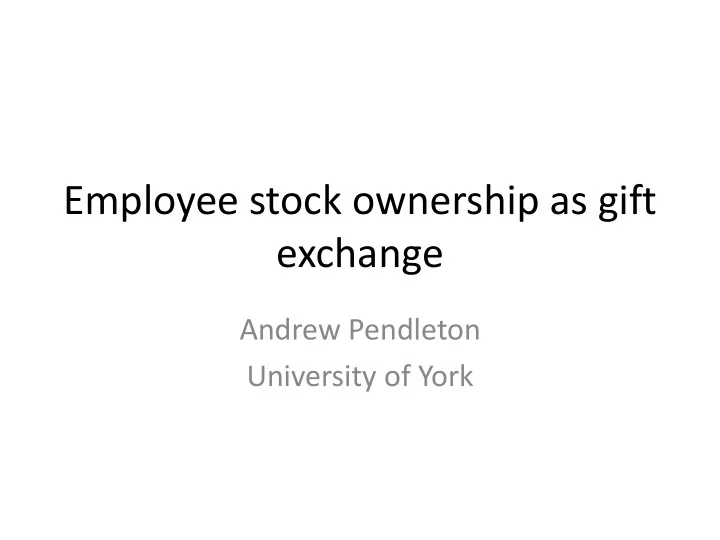

Employee stock ownership as gift exchange Andrew Pendleton University of York
The theory of ESO • Nearly all research and writing locates in ESO primarily in principal-agent framework. Provide incentives to get risk- averse agents to devote more effort to principal’s objectives. • BUT – ESO is probably a bad way of providing incentives in most cases – Risk – Illiquid (reward deferred in most cases) – Free-riding • ‘An incentive with no incentive effects’! • Some writers draw attention to alternatives – sorting (Lazear), retention (Oyer), protect human capital investments (Blair).
ESO covers a ‘multitude of sins’ • A fundamental problem in the literature is that we don’t differentiate different types of ESO. – Majority ownership. Owner gifts company to employees or leveraged buy-out. Sense of ownership important. Not primarily an incentive – Employer makes equity available to employees on favourable terms – s.423, s. 401k and/or provides free/discounted matches. Not primarily an incentive – Employer awards free shares – too blunt to be an incentive. Reward all equally or on some principle other than individual contribution, so incentive effects confused. – Employer awards options. May be an incentive depending on setting (eg high tech companies) • Key consideration is the context in which ESO occurs, and the objectives and understanding of the actors involved. Only in a small number of instances is ESO clearly used as an incentive (eg. Execs)
The limitations of hard incentives • Noise • Manipulation of asymmetric information • Partial metrics • Weakens intrinsic motivation. ‘Crowding out’ (Frey and Oberholzer- Gee AER 1997) • A signal of distrust and limitation of choice (Falk and Kosfeld AER 2006) • Conveys bad news about the task and agent’s ability ( Benabou and Tirole AER 2006) • Signals task has hidden worth to the principal – aim for a better deal? Recent work in economics suggests that low-powered incentives may work better than high-powered incentives, and experimental work that gifts have positive outcomes.
The role of gifts in employment relationships • Long tradition of work on gifts, trust, and reciprocity in economics and sociology (Gouldner 1960; Blau 1964; Bourdieu , Akerlof 1982). • Key characteristics of a gift – ‘given without clear specification of reciprocal action’ – But possible expectation that something will be done in return – Expresses a relationship that is something other than a simple transactional /market relationship. – Signals a desire to enter into a relationship – Expresses altruism to the recipient – Hope that the value of the gift to recipient exceeds the cost to the donor (reverse to position with incentives) – Expresses and generates trust – Generates and maintains social cohesion • Recent experimental work in economics suggests gifts may raise output
In what ways is ESO a gift? • A free gift where free share awards • Gives access to equity at advantageous prices with minimal transaction costs plus tax breaks • Gift of access to rising stock markets (beta can be more important than alpha) • The gift is not precisely linked to either past or future performance of the recipient • It has lasting value (normally) (unlike profit sharing payment). More than just the money • ESO ‘framed’ outside of normal work -effort relationships.
Evidence that ESO a gift • Language used by companies: ‘ sharing in success, sharing the benefits of performance’ • Share invitations normally use language of gifts – access to opportunities etc • Evidence that managers not looking to provide an incentive as such but something more diffuse eg. Create/maintain a relationship, promote identity, create a ‘happy family’
Why give a gift of ESO? • Signalling very important. The employer values the employee and the relationship • Invites (though doesn’t specify) reciprocal action eg. Employee commitment. The recipient will think well of you. • Attempt to go beyond instrumentalism of marketised employment relationship. Create ‘family’. Create identity (see Akerlof) • It’s the norm (isomorphism and sectoral effects) • Guilt (top exec pay etc) • Doesn’t cost that much (see Murphy). Externalised admin, tax breaks, new issues (prior to expensing) etc
How does it work? • Employees reciprocate with a gift – commitment, effort etc. Acceptance of the company’s gift signals that employees want to enter into gift relationship • Creates identity of the ‘company family’ • Employees want to continue to receive gifts (retention) • Positive signals to new recruits • Moderates perception of other company actions. Given that the gift is a choice, employees will see other policies as unavoidable (ie only do bad things because they have to) • Gift ‘framed’ separately from other rewards, hence big bang for the bucks.
Implications • ESO may work on its own. Participation in decisions no longer necessary to explain success of schemes. • BUT provision of information complementary. Trust means information sharing. Withholding information could undermine the gift • ESO can co-exist with high-powered incentives (cp. Alchian& Demsetz based perspectives). • Illiquidity of ESO may be a strength not weakness • Very important to protect employees from ESO going wrong. Sense of grievance when share price collapses
Empirical implications • Need examination of employee (and employer) views of the meaning and value of ESO • Re-think and examine complementarities with other HR practices in terms of impact on outcomes. Role of other gifts? • Re-examine configurations of ESO, reward, and HR practices
Conclusions • Viewing ESO as a gift fits with much of the language that is used to talk about ESO by companies • Removes difficulties encountered when view ESO as an incentive device eg the free rider problem. • Vital that we differentiate between settings and objectives of ESO. • Viewing ESO as gift exchange generates exciting new research agenda
Recommend
More recommend